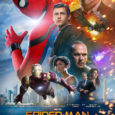This week I am offering up a classic film for witty younger kids, older kids, and adults and seniors that were formerly kids; Howard Hawks’ 1938 screwball comedy Bringing Up Baby. If you like deep plots, character motivations and subdued humor; well this isn’t the movie for you. Over the top, exhaustively quick paced, rapid-fire dialogue and cartoony Looney Tunes-esque personalities and gags, as well as real leopards and dogs running amok make up the entirety of this zany film.
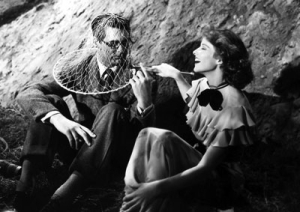
One of the many scenes where the actors more or less ad-lib their scene and are on the verge of breaking.
SUPER DUPER QUICK HISTORY LESSON:
The genre of slapstick and screwball comedy pulled from the physical comedy of silent film of the 1910’s and 20’s and subsequently has roots in vaudeville and stretching further back to comedy of manners plays which in various forms through the years itself reaches back to Ancient Greece. People have always loved to laugh. Especially if it’s extremely physical and over the top. The screwball comedy reached its peak during the 1930’s, petering out in the early 40s. A lot of the conventions or tropes the genre brought however have been continued to be utilized in comedy films since; they just don’t take it as extreme, with notable exceptions of course. Bringing Up Baby while not that succcessful when first released has in retrospect been held in high regard as a quintiscential example of the genre and is overall much liked today. And you should like it too.
THE OVERALL GIST:
Bringing Up Baby is simply about a mild-mannered paleontologist named David (played by Carry Grant) who whilst in the midst of assembling, after five years of hard work, a complete brontosaurus skeleton (barring one bone that is coming in the mail) and a pending marriage to a dour fiance is suddenly whisked into a series of misadventures with the capricious and manic socialite Susan Vance (Katherine Hepburn) he meets on a golf course. Said adventures are mostly centered around or involving a tame pet leopard named Baby and Susan dragging David across the Connecticut countryside (after what I dare you to guess). It’s a terribly good, sometimes exhausting romp to watch as no character is particularly normal or realistic. Everything is in hyperbole. Characters interrupt each other and keep talking causing a cacophony of chatter. Katherine Hepburn’s character keeps or rather steers the entire ship (even if that means sailing the ship right towards the rocks) so it’s not surprising to learn the script was more or less tailored for her.
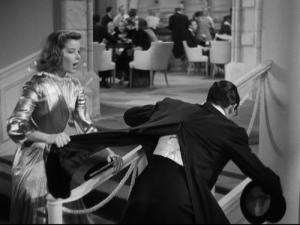
It gets worse.
I love the film and it has enough sight gags such as ripped dresses showing underwear, slipping, tripping, breaking things, people falling into water,just plain crazy situations that could in theory I think hold the attention of younger kids who would most likely laugh at many of the antics and the delivery of lines than truly understanding them. So perhaps try watching it with someone a bit younger, it’s by no means a child’s film but a family could easily enjoy this.
While speaking about content Bringing Up Baby is notable in that Carry Grant famously is forced to wear a women’s robe in one scene and ad-libs a line that many think is one of the first “mainsteam” uses of the word “gay” (certainly in a Hollywood film) as a possible reference to homosexuality rather than the, at the time, general usage meaning “genial” and “fun” or “happy”. The term has been noted to have already been used underground by the homosexual community since at least the 1920s and in pornography but did not really become common in the mainstream public vernacular with that context until nearly fifty years later, long after the film. If that was indeed the intended meaning of Carry’s ad-lib the film then marks a relatively important point in gay culture history in American pop-culture.
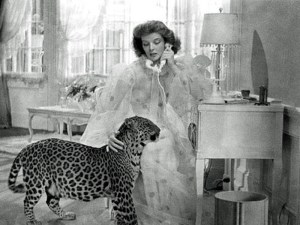
I really can’t think of anything to say for this image. Sort of self explanatory…
OVERALL VERDICT
Zany. Over the top. But oh so right, I love the film despite that in a lot of ways as a lot of all movies it is very outdated and not without its problems though in some of its stereotypes and other choices (the most likely dubious treatment of the animal actors) which of course reflect on the era. The movie was called already at times cliched back in 1938 by reviewers but I feel a lot of situations that are commonplace today in comedy films and other movie conventions really date back more or less to this film (one look at the brontosaurus and you know what’s going to happen to it right?)
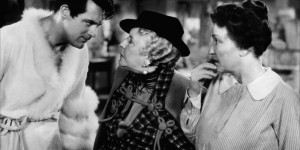
The infamous robe scene.
There is also of course the debate about Susan Vance.
A SUSAN VANCE ADDENDUM: Is she A MPDG?
So cartoonish, effervescent, manic and scheming is Susan Vance and the things she employs to harass and manipulate the rather hapless David (more or less because she decided that she fancied him) with little indication of any other wants or desires has in the past made film critic Nathan Rabin point out her character as a notable “early” example of the Manic Pixie Dream Girl trope (a character type he coined) in film. That is she solely exists to “change” the main character or tend to his needs.
But wait! Don’t let this turn you off from it!I call false. I call “NO!”
Well sort of. It can go in a lot of directions. I can certainly see why she would be called as such. I can see the complaint. However while she ends up providing David with, in retrospect the “funnest day of his life”, I personally did not see any particular lessons being actively taught through her in showing David how to live life or trying to bolster his spirit but rather more or less just claiming him as her own and dragging him around doing her thing until he basically caught up. He did change but it not seem her intent was to change him at all, rather just keep him.
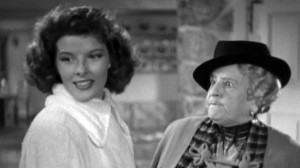
Any particular reason she wants to marry him? Nada. Any declaration that she will change him in order to do so or what she wants to see from him? Not that I remember other than saying he’s much better looking without his glasses. Does she silently work her schemes? No, in fact she outright says ” No, I know that I’m gonna marry him. He doesn’t know it but I am.” That sounds to me an awfully like a valid and very firm want. It’s limited, but it’s still a want.
Is the fact she announced the intent better than say passively not saying it? A little bit. It is fair and a valid complaint for people to wish more for female characters to have roles other than wanting the male lead and stop being more or less being used as a prop for said lead. Big yes. Can Susan be replaced with a sexy lamp in this film? No. Big no. Is it better that she voiced her want clearly as opposed to characters who do not? I think so. Hell, I myself as a playwright know the problem of not wanting to create one dimensional characters, particularly women. It’s not hard, but this movie is not trying too hard to really paint a picture of a realistic or real narrative.
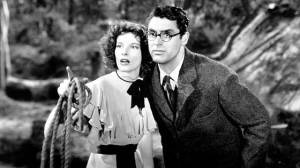
“We’ah huntin’ leopards”
But Susan doesn’t come off to me as an “ideal” or a idea of a woman. She is too ridiculous, too in-story obnoxious in a film where everyone is ridiculous to be taken too seriously. For her to be the only thing scoffed as fluff as if no one else in the film was equally fluff (and oh boy are they) is in itself crazy. Her motivations (which do extend to getting the leopard safely kept somewhere until she figures out what to do with it) concerning David for me ring as pretty valid within the context of the film. She’s an entitled upper-class debutante who seems to flit about doing what she does in the film anyway and in a bit of a whimsy claims a guy as her own perhaps deciding at first sight when she steals his golf ball. Where is the line where we dismiss a woman character who maybe, at the moment really only does care about a certain thing (as people can do) in a story this outrageous? The quick designation of women characters at times as Manic Pixie Dream Girls is I think in a way sort of tangled in it’s own version of misogyny. Zoe Kazan, screenwriter and actress (Ruby Sparks) shares a similar position. From an interview with Patti Greco for Vulture.com she commented about Susan Vance:
Well, yeah, there’s a line in the movie that basically questions the idea of manic pixie dream girls: “The quirky, messy women whose problems make them appealing are not real.”
Sure. What bothers me about it is I think that women get described that way, but it’s really reflective of the man who is looking at them, and the way that they think about that girl. Not about who that girl really is or what her personality actually is. I think that to lump together all individual, original quirky women under that rubric is to erase all difference. Like, I’ve read pieces that describe Annie Hall as a manic pixie dream girl. Katharine Hepburn in Bringing Up Baby. To me, those are fully fledged characters that are being played by really smart actresses. I just think it’s misogynist. I don’t want that term to survive. I want it to die.
Susan knows what she wants and David, while a funny choice (Carry’s passive and bespeckled David is notably the inspiration for Christopher Reeves’ iteration of Clark Kent in Superman) is still a choice and she doesn’t outright try to change him to make him happier. She is also incredibly flawed, a compulsive liar which they acknowledge and she is well aware of her hysterical nature and uses it on purpose. She’s devious. In fact Katherine Hepburn’s turn as the non-stop quipping, teasing, scheming and play acting Susan serves more like a trickster archetype; a skinny silk-covered Bugs Bunny to the bewildered David’s Elmer Fudd. Stirring up chaos for the sake of chaos. I like Susan. Could she exist really outside of this movie? Probably not. Or for that matter neither can any of the characters in this film. Nor Bugs Bunny.
I can’t give you anything but love, Baby.
Max Eber
Staff Writer/The Doctor
max@ihogeek.com
Twitter: @maxlikescomics







